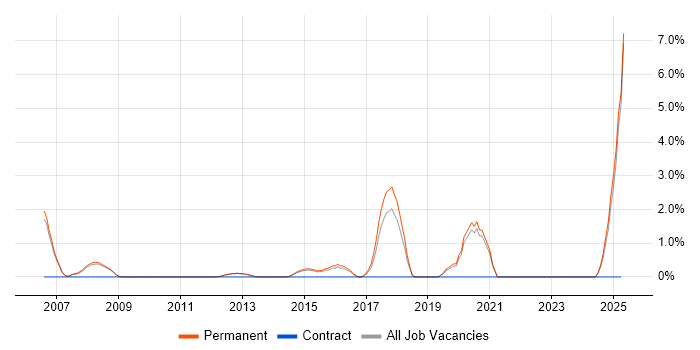Quality Management System (QMS)
Bedfordshire > Bedford
The table below provides summary statistics and salary benchmarking for jobs advertised in Bedford requiring QMS skills. It covers permanent job vacancies from the 6 months leading up to 1 October 2025, with comparisons to the same periods in the previous two years.
| 6 months to 1 Oct 2025 |
Same period 2024 | Same period 2023 | |
|---|---|---|---|
| Rank | 9 | - | - |
| Rank change year-on-year | - | - | - |
| Permanent jobs citing QMS | 2 | 0 | 0 |
| As % of all permanent jobs in Bedford | 3.85% | - | - |
| As % of the Processes & Methodologies category | 5.41% | - | - |
| Number of salaries quoted | 1 | 0 | 0 |
| 10th Percentile | - | - | - |
| 25th Percentile | £26,750 | - | - |
| Median annual salary (50th Percentile) | £28,500 | - | - |
| 75th Percentile | £30,250 | - | - |
| 90th Percentile | - | - | - |
| Bedfordshire median annual salary | £28,500 | - | - |
All Process and Methodology Skills
Bedford
QMS falls under the Processes and Methodologies category. For comparison with the information above, the following table provides summary statistics for all permanent job vacancies requiring process or methodology skills in Bedford.
| Permanent vacancies with a requirement for process or methodology skills | 37 | 52 | 70 |
| As % of all permanent jobs advertised in Bedford | 71.15% | 55.32% | 97.22% |
| Number of salaries quoted | 13 | 49 | 46 |
| 10th Percentile | £27,900 | £33,152 | £34,250 |
| 25th Percentile | £34,000 | £40,000 | £39,800 |
| Median annual salary (50th Percentile) | £35,000 | £50,000 | £50,000 |
| Median % change year-on-year | -30.00% | - | -13.04% |
| 75th Percentile | £45,000 | - | £65,000 |
| 90th Percentile | £64,600 | £56,300 | £66,250 |
| Bedfordshire median annual salary | £41,250 | £50,000 | £57,000 |
| % change year-on-year | -17.50% | -12.28% | +3.64% |
QMS
Job Vacancy Trend in Bedford
Historical trend showing the proportion of permanent IT job postings citing QMS relative to all permanent IT jobs advertised in Bedford.

QMS
Salary Trend in Bedford
Salary distribution trend for jobs in Bedford citing QMS.

QMS
Co-Occurring Skills & Capabilities in Bedford by Category
The following tables expand on the one above by listing co-occurrences grouped by category. They cover the same employment type, locality and period, with up to 20 co-occurrences shown in each category:
